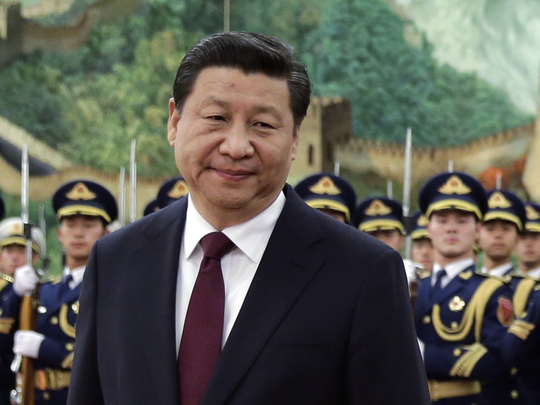
The news from China these days is mostly depressing, owing to the government’s escalating crackdown on its critics. But what few observers — particularly economic analysts — seem to understand is that the Chinese leadership’s fight against liberalism and “western values” is directly undermining its efforts to root out official corruption, promote innovation and entrepreneurship, and deepen engagement with the outside world. The regime’s retrograde politics will have serious consequences for China’s continued economic development.
For starters, the government has intensified its censorship of the internet, rendering popular portals and sites — including Google, Facebook, and the New York Times — all but inaccessible. Moreover, prominent human-rights lawyers have been jailed; the well-known free-speech advocate Pu Zhiqiang, for one, has already been held for over six months, while prosecutors attempt to build a case against him.
Meanwhile, senior Chinese officials have taken to enforcing political discipline within the Chinese Communist Party (CCP). Last June, Zhang Yingwei, head of the CCP’s discipline inspection office at the Chinese Academy of Social Sciences (Cass), said that the institution — China’s most prestigious government-run think tank — had been “infiltrated by foreign forces” and “was conducting illegal collusion at politically sensitive times”.
Zhao Shengxuan, Vice-President and Deputy Party Chief of Cass, responded by pledging that the Academy would “treat political discipline as a criterion of the utmost importance in the assessment of academics”. Soon after, Cass president Wang Weiguang thundered in an essay that class struggle would never be extinguished in China.
Chinese academia more broadly has been the regime’s chief target in its search for enemies, with universities dismissing professors for espousing “seditious” ideas like constitutionalism. In a particularly egregious case, an official newspaper in Liaoning province dispatched reporters disguised as students to college classrooms to catch professors criticising the regime.
A recent pronouncement by China’s education minister, Yuan Guiren, threatens to do damage on a far larger scale. Yuan has vowed never to allow textbooks “promoting Western values” — especially those that “attack or defame the leadership of the Party or smear socialism” — into Chinese classrooms. Given Yuan’s position, this pledge could effectively amount to official policy. One hopes, for China’s sake, that it does not.
The recent onslaught against free speech and western values reflects the central political challenge facing President Xi Jinping, who must transform a one-party system enfeebled by greed and mistrust into a well-ordered, ideologically united regime capable of carrying out market-based reforms and sustaining its own long-term survival. A crackdown on liberalism, he seems to believe, will work alongside his anti-corruption campaign to advance this goal.
This vision is as intellectually flawed as it is impractical. However hard one tries, it is virtually impossible to root out corruption in a one-party system without press freedom, a robust civil society, or the rule of law. Yet, these are precisely the “western values” that CCP apparatchiks are attempting to eliminate.
China will pay dearly for this mistake. Consider the impact of Yuan’s textbook campaign on China’s 28 million college undergraduates, who would be left with substandard course materials. How could these students be expected to compete in the global economy, when their education has been compromised in this way? The current trend implies deteriorating conditions for their teachers as well, particularly in the social sciences and humanities, as academics face tighter restrictions on scholarly exchanges with the West. With fewer opportunities to attend conferences abroad, publish papers in western academic journals or spend time teaching or conducting research outside of China, their professional development and careers could be severely impaired.
As a result, the government’s suppression of “western values” — not to mention its relentless war on the internet — is likely to spur an exodus of the country’s best and brightest. In 2013, an unprecedented 413,900 Chinese studied abroad — and the figure is expected to be even higher for 2014. Of those, 90 per cent chose to study in western countries (plus Japan).
To be sure, only a small fraction of college-age Chinese students attend universities overseas. Indeed, the number of students who went abroad in 2013 was equivalent to only 6 per cent of the students admitted to Chinese universities.
But China’s ruling elite, far from writing off this group as the price of its long-term survival, is leading the rush to the exits — largely sending its children to the Ivy League and Oxbridge. One wonders whether CCP leaders worry that their offsprings will be brainwashed by western values; they evidently already are reluctant to send their children to local universities. And, if Yuan has his way, China’s universities will increasingly look like their North Korean counterparts, rather than world-class western institutions.
That would have far-reaching — and devastating — consequences. The tens of millions of students who remain in China would not gain the knowledge and skills needed to maintain, much less improve, the economy’s global competitiveness. Indeed, given that innovation is critical to China’s continued economic development — a point that Xi has repeatedly emphasised — a war against western influence in Chinese education is downright irrational.
Unless the government’s crackdown ends soon, Xi’s “Chinese dream” of national greatness and prosperity will turn into a nightmare of accelerating decline and increasing backwardness. One way or the other, the war on Western values is a war that China can only lose.
— Project Syndicate, 2015
Minxin Pei is professor of Government at Claremont McKenna College and a non-resident senior fellow at the German Marshall Fund of the United States.









